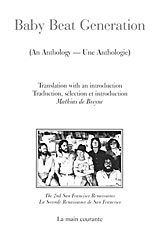 |
If ever there were a beatnik approach to event planning, Thomas Rain Crowe, organizer and emcee of Black Mountain College Museum + Arts Center’s upcoming tribute to Allen Ginsberg, exemplifies it.
“The point is, this is where I live,” says Crowe, explaining why the celebration was scheduled for Asheville. Ginsberg wasn’t from Asheville, didn’t live in Asheville, and — if indeed he visited Asheville — left no memorable writings reflecting the region. But the Asheville area is home to Crowe and a few other poets who considered themselves among Ginsberg’s friends and/or biggest fans. So take off your stomping shoes, cat — fall in and dig the happenings.
The celebration is one of many events planned nationwide to commemorate the 50th anniversary of the publication of Howl, Ginsberg’s groundbreaking near-epic poem. Local poets including Crowe, Ted Pope, Gillian Coats and Jaye Bartell, plus Allen Ginsberg Poetry Prize winner Richard Cambridge (of Boston), will read from their work, some accompanied by the musical stylings of the Q Jazz Trio.
“Everyone will be reading a short section of Howl, but the focus is on the people participating,” Crowe explains.
The featured poets can all be roughly grouped as belonging to the genus Beat, with varying degrees of influence separating them from the Ginsberg generation which begat them all. The younger poets may have almost inadvertently absorbed the Beat message of freedom, both physical and spiritual, while Crowe and his cronies moved to San Francisco — after Ginsberg had retreated to his farm in Cherry Valley, N.Y., and both Jack Kerouac and Neal Cassady had died alcohol-related deaths — to soak up the last rays of Beat culture. The enthusiastic proteges were dubbed “Baby Beats” by Richard Brautigan.
Crowe, a Graham County native who in the 1970s served as editor of a resurrected Beatitude magazine and palled around with Lawrence Ferlinghetti, says he doesn’t use the honorary title (though he doesn’t object when it’s bestowed upon him).
“The Beats were the Beats,” says Crowe. “We don’t refer to ourselves as Beats, or even Baby Beats. People in their 20s don’t call themselves beat poets — they’re just poets.” It’s worth noting, however, that at least one other Asheville-connected poet was similarly pigeonholed. In 1953, painter and Black Mountain College alumnus Leo Krikorian — the so-called “Grandfather of the Beats” — opened a West Coast bar called The Place, which was patronized by Ferlinghetti, Kerouac, Ginsberg, Ken Kesey, et. al.
All labels aside, the folks who reinvigorated the Bay Area’s dormant progressive literary scene are given their due in a new bilingual anthology edited by Mathias de Breyne. Crowe wrote the preface for the book, The Baby Beat Generation (The 1970s San Francisco Renaissance), which will be officially launched in the U.S. at the local Howl celebration. Like Howl, the book was first published in Europe.
“Part of the long-standing reality is that the counterculture that comes out of America is of more interest to people outside of the U.S.,” offers Crowe. “It’s just a fact.”
Ginsberg first read Howl publicly on Oct. 7, 1955, at the Six Gallery in San Francisco. His friend Kerouac crouched by the stage, chugging wine from a jug and screaming “Go!” at the end of long lines. When he finished reading, Ginsberg fled the stage in tears.
“I greet you at the beginning of a great career,” Ferlinghetti famously wrote in his congratulatory telegram. “When do I get the manuscript?”
The first edition of Howl was printed in England by Villers for Ferlinghetti’s City Lights Pocket Poets Series. But it was the second edition that got all the attention: In 1957, custom officials seized 520 copies of the book, declaring it obscene. While most readers today remember the “best minds of my generation destroyed by madness,” the courts were more concerned with the poem’s sodomizing motorcyclists.
Judge Clayton Horn sided with Ginsberg and Ferlinghetti, establishing the “redeeming social importance” test for censorship. “In considering material claimed to be obscene, it is well to remember the motto: evil to him who think evil,” Horn wrote.
Howl has since sold nearly one million copies and has never gone out of print. But its success raises the eternal conundrum: How does one memorialize art that demanded modernity? For Crowe, the answer is with more art informed by the Beats’ tendency to break taboos.
“You can recognize the living, breathing spirit,” he says of the surviving Beat aesthetic. “It may be experienced through a Hispanic or African-American perspective, but there’s a particular voice. Beats wear their spirituality, politics and sexuality on their sleeves.”
[Contributing writer Hanna Miller lives in Asheville.]
Black Mountain College Museum + Arts Center presents Howl! A Celebration of the 50th Anniversary of the Publication of Allen Ginsberg’s Book and the American book launch for The Baby Beat Generation (The 1970s San Francisco Renaissance) at BMCMAC (56 Broadway) at 8 p.m. on Fri., Dec. 16. Tickets are $7; $5 for members and students with ID. Call 350-8484 for more information.


Before you comment
The comments section is here to provide a platform for civil dialogue on the issues we face together as a local community. Xpress is committed to offering this platform for all voices, but when the tone of the discussion gets nasty or strays off topic, we believe many people choose not to participate. Xpress editors are determined to moderate comments to ensure a constructive interchange is maintained. All comments judged not to be in keeping with the spirit of civil discourse will be removed and repeat violators will be banned. See here for our terms of service. Thank you for being part of this effort to promote respectful discussion.